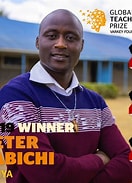African entrepreneurs, non-profits, and research organizations, according to Kenyan maths and physics teacher Peter Tabichi, winner of the 2019 Global Teacher Prize, “deserve huge recognition for the innovative solutions they have brought forward to rebuild the continent’s education systems in the age of COVID-19.”
Peter Tabichi, the 2019 Global Teacher Prize winner, today urged Africa’s “trailblazing” entrepreneurs, non-profits, and research organizations to apply for the Klaus J. Jacobs Best Practice Prizes in 2022, so that educators all over the world can learn about the innovative solutions they’ve developed to help the sector recover from the COVID-19 pandemic.
In September 2022, three Best Practice Prizes worth CHF 200,000 (approximately US$200,000) will be awarded.
Awarded every other year, the Klaus J. Jacobs Best Practice Prizes honour outstanding achievement and practice in advancing quality education. Applications for this year’s awards close on 10 February.
“I strongly encourage Africa’s trailblazing education innovators to apply for the Klaus J. Jacobs Best Practice Prizes. Now more than ever, in the age of COVID, we need examples of what education practices work on the ground. The pandemic disrupted learning for over 1.6 billion students, including more than 250 million primary and secondary school children throughout Africa who were affected by school closures. We need visionaries to help us face up to the challenges posed by COVID-19, but it is equally important to make sure that groundbreaking ideas can be applied to benefit as many children as possible.” Peter Tabichi, who hails from Pwani Village, Nakuru, Kenya, said.
“Africa is ripe with talent. Its education community understands first-hand the difficulties that children face when accessing learning, and this fuels its creativity to come up with innovative, transposable solutions that could help rebuild education the world over.”
“By showcasing examples of best practice on the ground, we can help to shift policy and ensure that all children have access to quality education. As education systems adapt to a new and unfamiliar terrain, there is not a moment to lose. We must bring to light the evidence of what works and use it to implement solutions that can be tailored to learners’ diverse individual needs – both here in Africa and globally.” Fabio Segura and Simon Sommer, Co-CEOs of the Jacobs Foundation, said.
“We’d like to thank Peter for his call to action. Supporting teachers as they continue to inspire, even as the world shifts under their feet, isn’t just the right thing to do – it’s the wellspring of our future. This way, we can help all children to thrive, and become socially responsible and productive members of society.”
The Best Practice Prizes have a history of recognizing exceptional African businesses. Africa is home to two of the three most recent winners, who were revealed in December 2020.
PEAS (Promoting Equality in African Schools) specializes in building and operating low-cost secondary schools in Uganda and Zambia for marginalised students.
Ubongo, founded in Tanzania, produces ‘edutainment’ for African children by making educational cartoons available for free on radio, television, print, and smartphones.
Dybuster, a Swiss-based edtech company that produces AI-based software for children with learning disabilities, was the third recipient of a 2020 Best Practice Prize.
The prizes are designed to identify the next generation of collaborative projects that promote education in four key areas.
First, the Jacobs Foundation seeks to identify ground-breaking projects that provide robust research evidence that may subsequently be used to inform policy and practice in the field of child learning and development.
Second, it seeks applicants who promote collaborations among scholars, governments, companies, and educational institutions.
A third focus is on creating entrepreneurial solutions to improve education policymaking.
Finally, contenders can provide innovative catalytic investment solutions that utilize a variety of financial instruments to maximize their resources and impact.
The Prizes are open to non-profits, public and private research institutions, businesses and entrepreneurs who are bringing forth innovative solutions to some of education’s biggest challenges.
Candidates must have secured funding for at least six months. Applications, which opened on 6 January 2022, can be made at https://jacobs.awardsplatform.com/. The closing date is 10 February 2022.
Winners will be selected by the Jacobs Foundation Board of Trustees. Selection is based on outstanding achievement, alignment with the Jacobs Foundation strategy (centred on generating evidence to transform how children learn from a young age), and willingness to engage in the Jacobs Foundation’s regions of focus.
Further criteria include the integration of lessons learnt from research and best practice; whether the project can be successfully replicated elsewhere; and how an organisation manages both its resources and the data it collects. Finally, contenders will be assessed on their organisational management, leadership culture, and financial viability.
The Jacobs Foundation provides two prizes in honour of its founder, entrepreneur Klaus J. Jacobs, who passed away in 2008. The awards are for remarkable achievements in research and practice in the field of child and youth development.
The Klaus J. Jacobs Research Prize, which recognizes pioneering, socially relevant research into youth development, alternates with the Best Practice Prizes.

